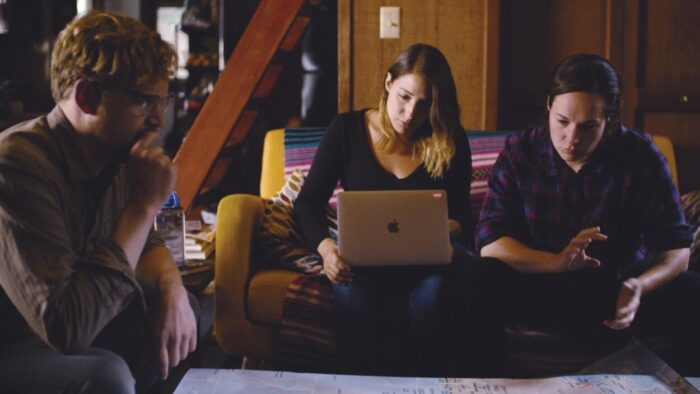In The Grab, director Gabriela Cowperthwaite (Blackfish, I.S.S.) and her principal investigative reporter Nate Halverson exploit the tropes of the docu-thriller to reveal what just might be the biggest threat facing the contemporary world. It’s one it takes the documentary nearly its full 104-minute runtime to explicate, as its reach extends across the world and its operations are largely conducted secretively, but there’s no doubting the immensity of The Grab‘s conclusions. There may be a dozen ways in which modern societies seem on the precipice of chaos, but Cowperthwaite and Halverson make a compelling case for what our future portends—and how, just maybe, a global crisis might be averted.
The story begins with pigs. Halverson was reporting a decade ago when a Chinese company purchased the American pork producer Smithfield in a takeover valued at $7.1 billion. It was not only the the largest-ever Chinese acquisition of an American company, one that accounted for a full fourth of America’s pork production. It was one, as Halverson discovered, was fully endorsed and underwritten by China’s government as part of their public policy. The deal raised the ire of protectionists and self-professed patriots, some of them motivated no doubt by anti-Chinese xenophobia. But it was just a shot across a bow, and not only between China and America.

“Follow the money,” the saying goes, and for the next decade Halverson did, uncovering other instances of foreign countries—China, Saudi Arabia, Russia—buying up land, water, production facilities overseas and even drafting American expertise to help them run their new facilities. It’s almost, just almost comic to watch an American-style rodeo in the middle of Russia, save for the fact that that country’s importing of Cowboys from the American West to teach them how to herd cattle portends some far more serious consequences for global conflict.
The Grab charts the expanding scope of this trend—nation-states across the globe investing far beyond their borders to guarantee food production and water security for an uneasy future—methodically and incrementally. Cowperthwaite’s narrative consists primarily of Halverson’s investigation, one that progressed in fits and starts over the course of a decade and involved, ultimately, crown princes and Navy SEALS. If the Arab Spring was any indication, and the film makes the case that it is, food and water security is what separates a nation’s ability to survive from its guaranteed fall. As the oft-cited adage goes “There are only nine meals between mankind and anarchy” (Alfred Henry Lewis, 1906). A country might be able to weather a shortage of any product or even an adversity like a global pandemic; yet when its citizens cannot eat or drink, chaos is certain to follow.
To quibble about any aspect of The Grab, which premiered at Toronto International Film Festival in 2022 and is this week releasing in theaters and on digital, may be an exercise in fiddling while civilization burns. So important, so jaw-dropping, so sobering is The Grab’s conclusion that we might all be best off planning for the uncertain future it predicts. But there too is the film’s weakness: that its depiction of a civilization on the precipice of a food- and water-related collapse is so broad, so global, so shadowy its actors, that it is simply difficult to depict in a documentary film.

Keeping Halverson’s ongoing investigation, which later expands to include fellow journalists Mallory Newman and Emma Schwartz, front and center provides The Grab its narrative structure. Much of The Grab‘s visual presentation relies on showing one or two or all of these three speaking to the camera and to each other, often staring at their laptops as they examine a mysterious and revelatory cache of documents called “The Trove” from one of Halverson’s anonymous sources. There are a few additional subjects interviewed, though most with real knowledge of the facts would scarcely be willing to speak to them for an investigative journalist’s documentary. Otherwise, Cowperthwaite is limited to dozens of shots of crops, facilities, protests, computers, and documents. The Grab’s argument may be compelling, but its visual rhetoric, for all Cowperthwaite and her team’s skill, is simply less so.
That fact shouldn’t dilute the power of what The Grab has to say. Whether one sees this documentary in the theater or on digital or simply takes it upon oneself to bone up on the topic—perhaps through Halverson’s other freely accessible reportage from The Center for Investigative Journalism, which contributed significantly to the content of The Grab—its central thesis should give everyone pause. Climate change isn’t a hoax, a ruse, or a front; it’s literally forcing nation-states to invade and colonize others to secure their livelihood in an insecure, destabilized future. That one might not be effected by it today—though we all probably are—does not mean we won’t be soon.
Magnolia Pictures & Participant will release THE GRAB in theaters and on demand June 14th, 2024



